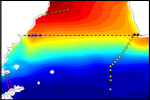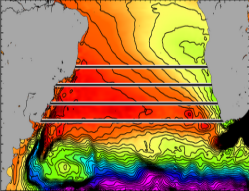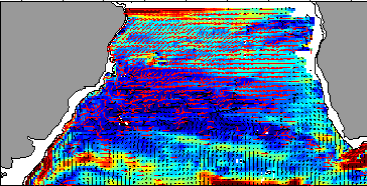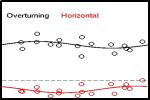SAMOC Studies at AOML

South Atlantic Meridional Overturning Circulation (SAMOC) Initiative
SAMOC is an international initiative to study the role of the South Atlantic in the Meridional Overturning Circulation. For additional information: Go
SAM, Southwest Atlantic MOC project
Christopher Meinen, Silvia Garzoli, Renellys Perez, and Shenfu Dong
The Southwest Atlantic Meridional Overturning Circulation Program (SAM), which began in 2009, seeks to capture key components of the AMOC in a hitherto under-sampled region - the South Atlantic Ocean. Go

SAMOC Altimetry Project
Estimates of the South Atlantic Meridional Overturning Circulation (SAMOC) using satellite-altimetry data at different latitudes Go

Argo Altimetry Project
Claudia Schmid, and George Halliwell
Estimates of the South Atlantic Meridional Overturning Circulation (SAMOC) based on Argo and satellite-altimetry data Go

Evaluating the Ocean Observing System: Quarterly Reports on the Meridional Heat Transport Variability in the Atlantic Ocean
Molly Baringer, Silvia Garzoli, and Gustavo Goni
Quarterly reports assessing the state of the Atlantic oceanic heat transport derived using data collected from high density XBT lines AX7 and AX18 part of the NOAA/OCO Global Observing System for the North and South Atlantic. Go
Observing Methods for the Meridional Overturning Circulation and Meridional Heat Transport in the South Atlantic
Renellys Perez, Silvia Garzoli, and Chris Meinen
Project to analyze multiple models and determine the optimal design and location for a zonal trans-basin array that will characterize the variability of the Meridional Overturning Circulation (MOC) and meridional heat transport (MHT) in the South Atlantic. Go

Assessing the Sensitivity of Northward Heat Transport/Atlantic Meridional Overturning Circulation to Forcing in Existing Numerical Model Simulations
Shenfu Dong, Molly Baringer, Gustavo Goni and George Halliwell
This project investigates the role of Ekman and geostrophic transports, as well as the overturning and horizontal transports, in observed and simulated Atlantic Meridional Overturning Circulation (AMOC) and Meridional Heat Transport (MHT). Go
Assessment of the Meridional Overturning Circulation and Meridional Heat Transport and their Meridional Variability in the South Atlantic Ocean
Gustavo Goni, and Shenfu Dong
Satellite altimetry observations are used in this project to assess the temporal and meridional changes of the MOC in the South Atlantic Ocean. Go
South Atlantic Meridional Overturning Circulation: Pathways and Modes of Variability
Renellys Perez and Silvia Garzoli
Our research focuses on the analysis of state-of-the-art eddy-permitting and eddy-resolving NOAA/GFDL model simulations to characterize the pathways of the upper and lower limb of the MOC in the South Atlantic and identify the dynamical mechanisms that control these pathways. Go